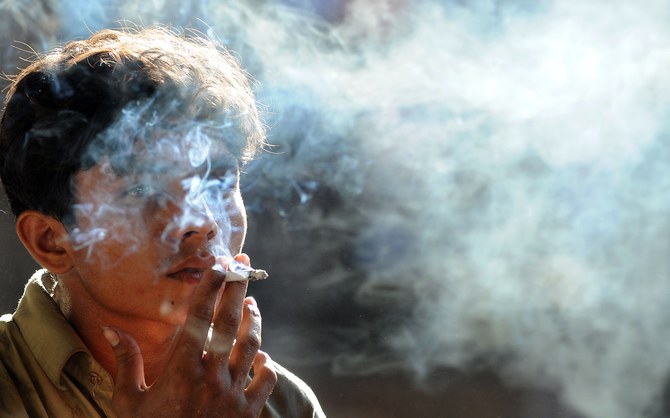
“I’ve been smoking since I was in seventh grade,” says Hussain, a 20-year-old BS student at a government college. “I used to get cigarettes easily from a shop near my school and smoke them with two friends.”
Now a college student, Hussain continues to buy cigarettes from a shop near his campus. Reflecting on his childhood, he shares, “No policeman or shopkeeper ever stopped me from buying cigarettes, even back then.”
Hussain's story isn’t unique. It is emblematic of a broader issue in Pakistan, where more than 20 million people smoke, according to estimates. Despite stringent laws such as the Prohibition of Smoking and Protection of Non-Smokers Health Ordinance 2002, which bans the sale of tobacco products near educational institutions and to minors, enforcement remains weak.
Also Read: Policeman and Polio Worker Killed in Attacks on Anti-Polio Teams in KP
The impact of smoking extends beyond public health, touching Pakistan’s economy, agriculture, and legislative framework. Vice Chairman of Khyber Pakhtunkhwa Ittihad Kashtkaran (Farmer Alliance), Muhammad Iqbal, highlights the multifaceted nature of the issue.
The tobacco industry contributes significantly to government revenue through taxes. Iqbal notes, “The hefty tax revenue from tobacco makes policymakers cautious about implementing strict regulations.” This financial reliance complicates efforts to curb tobacco use effectively.
For many farmers in regions like Khyber Pakhtunkhwa, tobacco is a vital source of livelihood. “Policymakers face pressure to offer concessions to tobacco growers,” Iqbal explains. However, the challenges are mounting. The major hurdles affecting the local industry are smuggling, excise duties, and regulatory gaps.
One of the most significant issues highlighted by Iqbal is tobacco smuggling. “Every year, cigarettes worth approximately PKR 300 billion are smuggled into Pakistan,” he says. These illegal products, which often bypass local tobacco sources, not only undermine local growers but also lead to substantial tax revenue losses for the government. Smuggled cigarettes pose a dual threat—displacing locally produced tobacco and challenging the legal industry’s stability.
Another pressing concern is the excise duty on raw tobacco. Pakistan imposes an excise duty of PKR 390 per kilogram on unprocessed tobacco, a rare policy globally. “Excise duties are typically levied on finished products like cigarettes, not raw materials,” Iqbal explains. This increases the cost of production, making it harder for local farmers to sell their crops. Consequently, both domestic industries and export opportunities suffer.
Despite laws banning smoking in public places and the sale of tobacco near educational institutions, enforcement remains lax. Hussain’s ability to buy cigarettes as a minor without restriction is a glaring example. “If laws were strictly enforced, no one would dare to violate them,” Iqbal asserts.
The challenges surrounding tobacco regulation in Pakistan demand urgent attention. While the government grapples with balancing economic interests and public health, stories like Hussain’s reflect the human cost of policy gaps. The prevalence of underage smoking, fueled by easy access and inadequate enforcement, signals the need for stronger implementation of existing laws and the development of more comprehensive policies.
As Pakistan continues to tackle smoking-related issues, the need for collaboration between policymakers, law enforcement, health officials, and agricultural stakeholders has never been more critical. Ensuring the health of its young population and safeguarding its economic and agricultural interests require a concerted and sustained effort. Hussain’s story is a sobering reminder of what’s at stake for individuals and the nation.